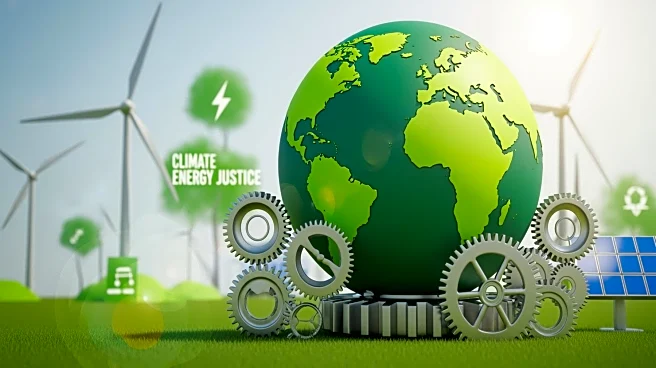What's Happening?
The Energy and Resources Institute (TERI) has released a paper ahead of the 30th Conference of the Parties (COP30) to the UNFCCC in Belém, Brazil, urging a re-anchoring of global climate cooperation in equity
and human development. The paper, authored by Dr. Shailly Kedia and reviewed by Mr. RR Rashmi, emphasizes the need to integrate human development and energy consumption into climate justice frameworks. It proposes a measurable approach to the principle of Common but Differentiated Responsibilities and Respective Capabilities (CBDR-RC), linking energy sufficiency to dignity and development. The study highlights the imbalance between climate ambition and development, noting that energy poverty equates to human poverty. It categorizes countries into eight zones based on their per capita energy consumption and Human Development Index (HDI) levels, advocating for differentiated yet complementary trajectories to achieve climate justice.
Why It's Important?
The paper's call for re-anchoring climate cooperation in equity and shared prosperity is significant as it addresses the ongoing challenge of balancing climate goals with human development needs. By redefining CBDR-RC as a dynamic principle, TERI aims to ensure that climate justice is pursued alongside sustainable development. This approach could influence policy frameworks and global dialogue, encouraging countries to adopt strategies that address both underconsumption in developing nations and overconsumption in high-income countries. The emphasis on energy access as a fundamental component of human development underscores the need for equitable clean energy solutions, which are crucial for healthcare, education, and livelihoods.
What's Next?
As COP30 approaches, TERI's paper may prompt discussions among global leaders on the integration of human development into climate policies. The proposed HDI–Energy Zoning Framework could serve as a basis for negotiations, potentially influencing commitments and actions at the summit. Countries categorized in different zones may need to reassess their energy consumption and development strategies to align with the principles of equity and sustainability. The paper's insights could lead to a shift in how climate justice is operationalized, with a focus on bridging gaps between climate ambition and sustainable development.
Beyond the Headlines
The paper's emphasis on energy poverty as human poverty highlights the ethical dimension of climate justice, advocating for a holistic approach that considers both environmental and social factors. By redefining CBDR-RC, TERI challenges the static differentiation of responsibilities, proposing a framework that evolves with changing capacities and responsibilities. This approach could lead to long-term shifts in global climate cooperation, fostering a more inclusive and equitable dialogue that prioritizes human well-being alongside environmental sustainability.









